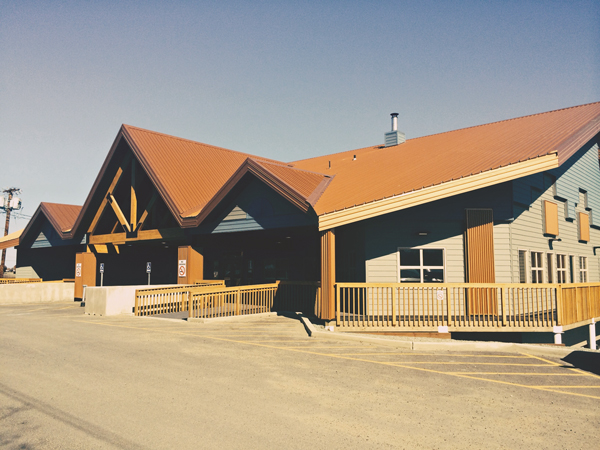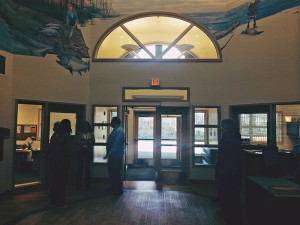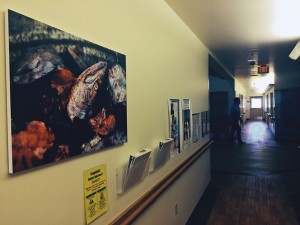
The Y-K Delta’s first skilled nursing facility is open and just received the federal certification necessary for payment from for Medicare and Medicaid.
The certification comes just as Yukon Kuskokwim Health Corporation, which runs the Elders Home, faces an $11.7 million budget shortfall.

Today the staff of the Elders Home in Bethel is celebrating their recent certification with a party. YKHC CEO Dan Winkelman steps away from the celebration and into the airy entryway of the newly constructed Elders Home in Bethel, which is decorated with a mural depicting the seasons.
“You’ll see a seal hunter with his catch there and his kayak and you’ll see a berry picker as you go in a clockwise direction and she’s picking salmonberries and then you’ll see some swans flying across the tundra,” Winkelman said.
The nursing home, which looks more like a fishing lodge from the outside, is a project of YKHC that’s been planned for decades to give elders in the Delta care closer to home.
YKHC is grappling with an $11.7 million budget shortfall due to revenue collections issues and sequester cuts to Indian Health Service funding. YKHC has been picking up $2 million in operating costs since the home opened in October because it lacked certification, said Winkelman.
The home attempted certification twice: In October there were 17 deficiencies and five in December, when they tried again. The home finally passed federal certification in April, allowing Medicare and Medicaid billing.
Gerald Hodges manages the Elders Home. He leads me from the entry into a hallway that separates two wings of the home, past a chapel on our left and a therapy room with exercise equipment to the right and into a common area.

“As we go here then to the right in this side here we have a total of eight rooms. We also have right in front of us here is an area we call our native kitchen and we have a stove with a commercial hood microwave, refrigerator, freezer and a sink. And it’s designed so that family members can come in and prepare foods for their elders,” Hodges said.
Elders recline in cushy chairs watching a DVD of Camai Dance Festival on large screen TV. Signs around the building are in Yup’ik and English and several of the staff speak Yup’ik.
The idea, Hodges says, it to improve quality of life for the aging population of he Y-K Delta region, by allowing them to stay closer to home to receive culturally relevant care. The closest skilled nursing homes are in Nome and Kotzebue. Previously, residents who needed nursing home care had to relocate to the road system. Hodges leads me into a resident room.
“Here’s our typical private room. We have a bed. We have a dresser. Each room has a countertop with a sink. The other nice feature we have in all the room is that we have an overhead lift. A lot of the elders aren’t able to get themselves out of bed or they need help getting into a chair an this electric lift is so nice, it comes over, it comes around and it actually drives itself along the track and the track goes all the way around and into the bathroom,” Hodges said.
The state’s older population is expected to more than double in the next 20 years from around 72,000 to more than 150,000 in 2030.
Denise Daniello with the Alaska Commission on Aging says more facilities like the Elders Home in Bethel are needed. She cites data showing Alaska has the fastest growing senior population in the nation, and the fastest growing segment includes those 85 and older.
“Currently we have about 5,900 people age 85 and older that is projected to more than triple over the next 20 years to 18,800 people age 85 and older. And this population is the most vulnerable and also most at risk for developing chronic disease conditions as well as Alzheimers disease related dementia.” Daniello said.
Winkelman says the Elders home has received more than 30 applications for the twelve remaining rooms and he says once people see how homey it is, he thinks they’ll be a waiting list.
“That’s the idea with the home is you want to make it nice so people can live here an that ‘s what it’s all about is for the clients to come in and feel comfortable and make it their own home,” Winkelman said.
YKHC worked with senator Lyman Hoffman and representative Bob Herron to secure appropriations for the Elders Home. Construction cost $16.3 million dollars.
Daysha Eaton is a contributor with the Alaska Public Radio Network.
Daysha Eaton holds a B.A. from Evergreen State College, and a M.A. from the University of Southern California. Daysha got her start in radio at Seattle public radio stations, KPLU and KUOW. Before coming to KBBI, she was the News Director at KYUK in Bethel. She has also worked as the Southcentral Reporter for KSKA in Anchorage.
Daysha's work has appeared on NPR's "Morning Edition" and "All Things Considered", PRI's "The World" and "National Native News". She's happy to take assignments, and to get news tips, which are best sent via email.
Daysha became a journalist because she believes in the power of storytelling. Stories connect us and they help us make sense of our world. They shed light on injustice and they comfort us in troubled times. She got into public broadcasting because it seems to fulfill the intention of the 4th Estate and to most effectively apply the freedom of the press granted to us through the Constitution. She feels that public radio has a special way of moving people emotionally through sound, taking them to remote places, introducing them to people they would not otherwise meet and compelling them to think about issues they might ordinarily overlook.




